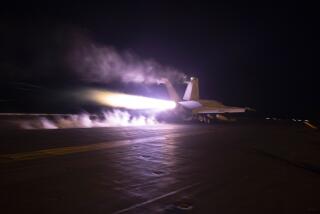Stay On, With Others, in the Gulf : Caution Is Called For, but So Is Firm Resolve to Protect Trade
- Share via
The attack on the Stark graphically demonstrates once again the chilling effectiveness of modern sea-skimming anti-shipping missiles.
In May, 1982, during the Falklands war, the British destroyer Sheffield was crippled in an attack by an Exocet missile launched by the Argentine air force. The extent of the damage to the Sheffield by a single missile raised the question of the viability of deploying expensive surface ships that can be so effectively neutralized.
But the attack on the Stark, as it patrolled the Persian Gulf, also raises questions about U.S. policy in that part of the world, and whether any long-term plan has ever existed. The American public’s shock and outrage over the incident is only compounded by a sense of bewilderment as to why ships are even in a high-risk area without any apparent clearly defined goals.
The Administration’s Middle East policy and America’s image in the region have been dealt significant setbacks over the last three years. The withdrawal of U.S. Marines from Lebanon after suffering major casualties to no apparent purpose did a great deal to cast doubt on President Reagan’s foreign-policy objectives. The Iran- contra affair has only added to the sense of confusion among America’s friends and allies in the region, such as Kuwait and Saudi Arabia, who view any expansion of the Iran-Iraq war as a distinct threat to their own internal stability. It is against this background that the attack on the Stark has to be examined.
The public has every right to be outraged at the attack on a U.S. Navy vessel by seemingly friendly aircraft. But there have been U.S. Navy vessels in the Persian Gulf for the last 40 years. To withdraw U.S. ships as a result of this incident would only serve to cripple America’s prestigefurther in both the Persian Gulf and the Middle East, and depreciate the chances of ever bringing any type of lasting peace to the area.
The Reagan Administration must now exercise both caution and resolve in carrying out its duties in the Persian Gulf. Part of that resolve must include clear-cut policy objectives. The President has taken the right step by informing both sides that any plane showing hostile intent toward a U.S. vessel now will be subject to that vessel’s defensive measures. But it would be a mistake to dramatically increase the U.S. naval presence within the narrow geographic confines of the Persian Gulf. Greater militarization of those waters is not the right step.
U.S. Navy vessels have a significant array of on-board defense weapons to protect themselves. Why the Stark did not respond to the incoming missiles should be left to a board of inquiry to determine, not to speculation. Should it be discovered, however, that the on-board systems failed to operate as necessary, then immediate steps must be taken to discover why. Any ship is vulnerable to such an attack, but if the systems failed to operate for any reason, that would cast serious doubt on any U.S. warship’s ability to defend itself.
American ships have a right to be in the the Persian Gulf to protect vital U.S. interests and to help ensure the freedom of navigation of international waters. The United States also has the right to ask for at least a token naval presence from its West European allies and Japan, who import a far greater volume of oil from the region than the United States does. While U.S. oil imports from the area are far lower than those of its allies, a closure of the Persian Gulf would have dramatic economic consequences for everyone.
An active foreign policy is not risk-free, and the United States should not retreat in the face of what appears to be an isolated incident. In the past nine months Iraqi aircraft have flown more than 330 missions launching 90 anti-shipping missiles, 40 of which have hit targets such as tankers and radar reflectors, or land-based targets on the Iranian side of the Persian Gulf. None of these firings were against U.S. merchant or Navy vessels.
Thus it would appear that the attack was indeed an unfortunate accident, and the quickness of Iraq’s apology seems to underscore that explanation. Yet that in no way excuses what happened. Iraqi aircraft possess a deadly capability with air-launched Exocet and laser-guided missiles. Their pilots should clearly identify their targets first and not just randomly fire at a blip on the radar screen that is perceived to be a hostile target.
In trying to take a neutral stance in such a precarious war, the United States is faced with an almost imponderable set of options. It cannot ignore its duties to the international community, especially when requests for assistance come from nations like Kuwait.
The United States is a global naval power; it cannot and must not retreat from its commanding position on the high seas.
But the Reagan Administration should, along with the allies in the region and the industrialized nations of the world, attempt to bring about a diplomatic end to the Iran-Iraq war--and without a heightened military presence, which surely would drag the United States deeper into the conflict.
More to Read
Sign up for Essential California
The most important California stories and recommendations in your inbox every morning.
You may occasionally receive promotional content from the Los Angeles Times.












